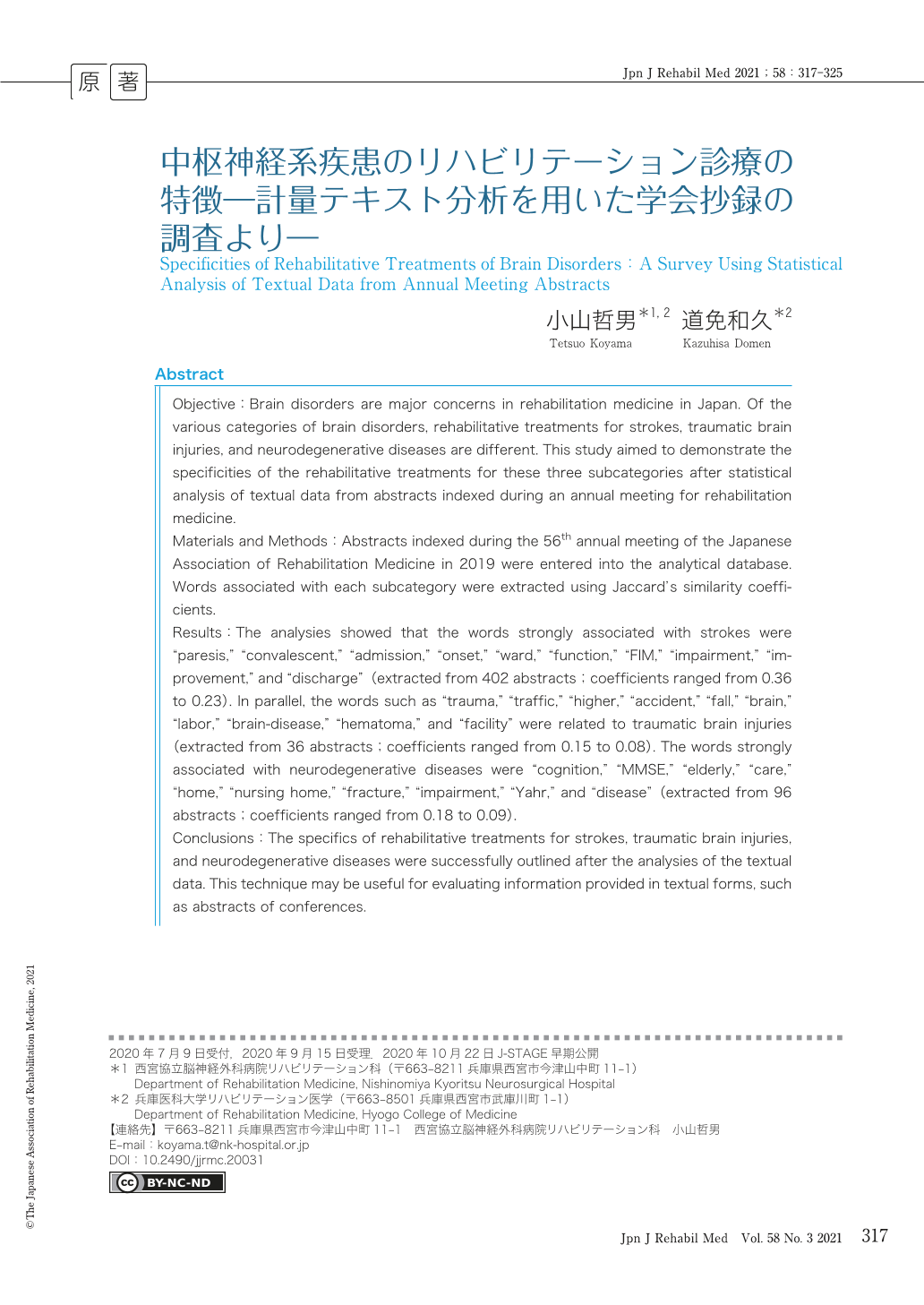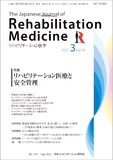Japanese
English
- 販売していません
- Abstract 文献概要
- 1ページ目 Look Inside
- 参考文献 Reference
要旨
目的:中枢神経系疾患(脳卒中,頭部外傷,神経変性疾患)は,リハビリテーション科の診療対象として患者数が多い.脳卒中,頭部外傷,神経変性疾患はすべて脳疾患の範疇であるが,そのリハビリテーション診療はそれぞれ異なる.今回,計量テキスト分析を用いて年次学術集会の抄録を解析し,これらのリハビリテーション診療の特徴を調査した.
対象および方法:第56回日本リハビリテーション医学会学術集会(2019年)の公募演題1,424題を解析対象とした.脳卒中,頭部外傷,神経変性疾患の疾患群別にコーディングを行った.類似度の指標であるJaccard係数に基づき,それぞれの疾患群について関連語抽出を行った.
結果:脳卒中群402題について,関連語の上位10個は「麻痺,回復期,入院,発症,病棟,機能,FIM,障害,改善,退院」(係数0.36〜0.23)であった.頭部外傷群36題について,関連語の上位10個は「外傷,交通,高次,事故,転落,脳,就労,脳症,血腫,機関」であった(係数0.15〜0.08).神経変性疾患群96題について,関連語の上位10個は「認知,MMSE,高齢,介護,在宅,施設,骨折,障害,Yahr,疾患」(係数0.18〜0.09)であった.
考察:年次学会抄録集を計量テキスト分析により解析することで,それぞれの疾患群のリハビリテーション診療の体系化が可能であった.
Objective:Brain disorders are major concerns in rehabilitation medicine in Japan. Of the various categories of brain disorders, rehabilitative treatments for strokes, traumatic brain injuries, and neurodegenerative diseases are different. This study aimed to demonstrate the specificities of the rehabilitative treatments for these three subcategories after statistical analysis of textual data from abstracts indexed during an annual meeting for rehabilitation medicine.
Materials and Methods:Abstracts indexed during the 56th annual meeting of the Japanese Association of Rehabilitation Medicine in 2019 were entered into the analytical database. Words associated with each subcategory were extracted using Jaccard's similarity coefficients.
Results:The analysies showed that the words strongly associated with strokes were “paresis,” “convalescent,” “admission,” “onset,” “ward,” “function,” “FIM,” “impairment,” “improvement,” and “discharge” (extracted from 402 abstracts;coefficients ranged from 0.36 to 0.23). In parallel, the words such as “trauma,” “traffic,” “higher,” “accident,” “fall,” “brain,” “labor,” “brain-disease,” “hematoma,” and “facility” were related to traumatic brain injuries (extracted from 36 abstracts;coefficients ranged from 0.15 to 0.08). The words strongly associated with neurodegenerative diseases were “cognition,” “MMSE,” “elderly,” “care,” “home,” “nursing home,” “fracture,” “impairment,” “Yahr,” and “disease” (extracted from 96 abstracts;coefficients ranged from 0.18 to 0.09).
Conclusions:The specifics of rehabilitative treatments for strokes, traumatic brain injuries, and neurodegenerative diseases were successfully outlined after the analysies of the textual data. This technique may be useful for evaluating information provided in textual forms, such as abstracts of conferences.

Copyright © 2021, The Japanese Association of Rehabilitation Medicine. All rights reserved.


